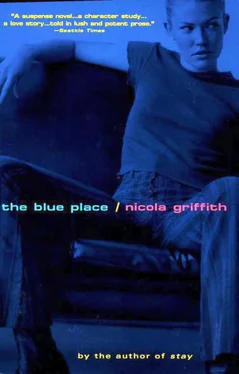“Very well, I’ll put your call through.”
A click. Purring electronic ring. Another. Again. On and on. Endless. The carbohydrates were cascading through my system. I disconnected, pressed the redial button.
“Put the manager back on,” I told the flustered young night clerk. “Rolf, she must have turned off the ringer. I want you to go knock on her door.”
“Ms. Torvingen, it is absolutely against our policy to disturb a guest.”
“This is an emergency.”
“Then may I suggest you call the police?”
He had reached the place where the officious become immovable, and the telephone was not a sharp enough tool. I switched tactics. “Rolf, this really is terribly urgent, but I think I know a way you can help me, if I may presume upon you for a favour.” Julia was safe in bed in a well-run hotel. I could be there before breakfast. “If you’re not too busy, perhaps I could persuade you to take down a note and slip it under her door where she will see it as soon as she wakes in the morning.” Where she would see it, bright and incongruous against the carpet if she got up to answer the knock of a strange man in the middle of the night. “Please, Rolf, could I ask you to do that?”
“I…well, perhaps I could do that.”
“Oh, thank you. The message is to read: ‘Very urgent, take all precautions, call Aud immediately, repeat, immediately.’” He scribbled industriously. I was very, very thirsty. I wanted to say more, but I knew the Rolfs of the world. Any mention of blood, of danger or bullets on the fjell would prompt an immediate withdrawal because it would mean I was a crazy woman: such things did not happen in Norway. “Please add…” What? Don’t talk to two men called Ginger and McCall who have been sent to kill you? “Please add my love. Please underline the words ‘very’ and ‘all.’”
“Very well.”
“And…Mr. Lothbrok”—make him feel big and clever and in charge—“you will see to that right away, won’t you? I just couldn’t sleep until I know she’s got the message. You’ll put it under her door?”
“As soon as I put the phone down, Ms. Torvingen.”
“Thank you, thank you very much.”
Then I suggest you call the police . Oslo police are typical Norwegians—everything one at a time, in the right order, by the book. They would show up at the hotel, ask a few questions, maybe wake Julia and talk to her. Julia would be safe—for tonight. The police would also show up here. They would surround me. They would want to know how I got shot. They would ask whose car it was. They would not let me talk to Julia. And when they stopped surrounding Julia because they thought I was crazy, I would be in a hospital cell, unable to protect her. No, not the police. Julia was safe for the night; Rolf and his staff were sticklers for protocol, wouldn’t tell anyone her room number; and she would see the note when she woke up in the morning.
I needed water, painkillers, heat, more food, in that order, but they would have to wait. I needed to think. A man from Atlanta had hired three Americans to kill Julia. It had to be Honeycutt, or his blackmailer. If it was Honeycutt, he had to be acting on his own; the cartel would have used their own people. Locals. But how had Honeycutt—or the blackmailer—known we were in Norway, and how had he known where to start looking? I should call Annie, but she would have questions and I had no answers. Nothing made sense.
Think about it later. What mattered now was Julia, and for that I would need help. Local help who were not too fussy about the law.
It was nearly three in the morning, an hour earlier in London. I picked up the phone again and called a number my mother had given me when I first left home, one I had never had to use. She answered on the third ring, alert. “Yes.”
“It’s Aud. I need your help.” I could almost see the lightening then sudden stilling of her face as she understood that it was her daughter, not World War III, but that I was in trouble. There was a click on the line.
“A tape,” she said, “so you don’t have to repeat anything.” Norwegian. I couldn’t remember the last time we had spoken our native tongue together.
“I’m at the seter, on a cell phone.” I gave her the number. “I need the phone number of the Federal Police commander in Tijuana. A private number, or home number if possible. And the number of someone else, someone he might know, whom he could call to confirm my identity.”
She must have had a hundred questions but she asked only one. “How urgent?”
“It…Julia, a woman I love, it might mean her life.”
“I’ll call you back within an hour.”
Until she called, there was nothing more I could do. Now was the time for the water, painkillers, heat and food.
I took the old tin box that was the seter’s first-aid kit down from the bathroom shelf and ministered to myself with grim efficiency. Strip off damp pants. One syrette of morphine in the upper quadrant of right thigh. Pull on clean, dry pants. Drink water while that takes hold, fill kettle with water and put on to boil. Lay out compresses, antibiotic cream, peroxide, bandages. Think how I want to appear tomorrow in Oslo. Find clean dry knit silk tunic. Strip off damp, bloody sweater. Pick up peroxide.
It was messy, it hurt, I passed out twice. I ended up having to use a doubled-over pillowcase as well as the compresses: I could not afford to bleed in public tomorrow. I made instant coffee, very strong, and wished I had some soup that was not in cans. I ended up tearing chunks of ham from the bone with my teeth, and pulling the rest of the loaf to pieces. The morphine was laving my torn muscles like warm milk, swaddling my nerve sheaths in cotton wool. I could move my left hand well enough to steady a hot-water bottle, which I filled from the kettle in my right. It took four trips to assemble writing paper, ballpoint pen, coffee, hot water bottle and phone on the table in the living room.
The embassy in London would be a hornet’s nest, my mother rousting everyone out of bed, having them in turn rouse people in other embassies who owed her favours; tracking down the information I needed. I had seen her work before.
The pen was an old one, its clear octagonal plastic barrel chewed at the end, and when I put the tip to paper, it left a blot. I wrote the date, then paused. This must have been how Vortigern the High King felt when the last of the Roman legions withdrew, leaving fourth century Britain open to the prowling Saxon seawolves, and he had gambled, had picked a few from the pack and befriended them, gifted them with land along the south shore in return for a promise to defend the country from their hungry, landless cousins. Classic strategy, divide the enemy and hold the two opposing camps in perfect tension, only Vortigern had not known the sheer weight of numbers pressing up against the Saxon shore; the tension was unequal; his gamble had failed. The might of the Tijuana cartel and of Honeycutt were decidedly not equal, but when the cartel crushed Honeycutt and wanted to turn on me, this letter would be my Roman Legion in the hole.
I wrote steadily.
The phone rang. It was my mother. Fifty minutes. “The Tijuana Federal Police commander’s name is Luis Palma. I have his home number, his private work line, and the general office number. The name of the man in Tijuana who can confirm your identity is Hector Lorca, a television anchor. I have already called him, and he has agreed.” He must owe her a tremendous favour. Well, now so did I.
“Thank you.”
“Bring Julia to London to thank me.”
Four a.m. Still yesterday in Mexico, where Luis Palma would be sitting down to dinner with his family while outside the sky turned red.
I dialed. It didn’t have a chance to ring before it was picked up and a smooth male voice said, “Palma residence.”
Читать дальше












